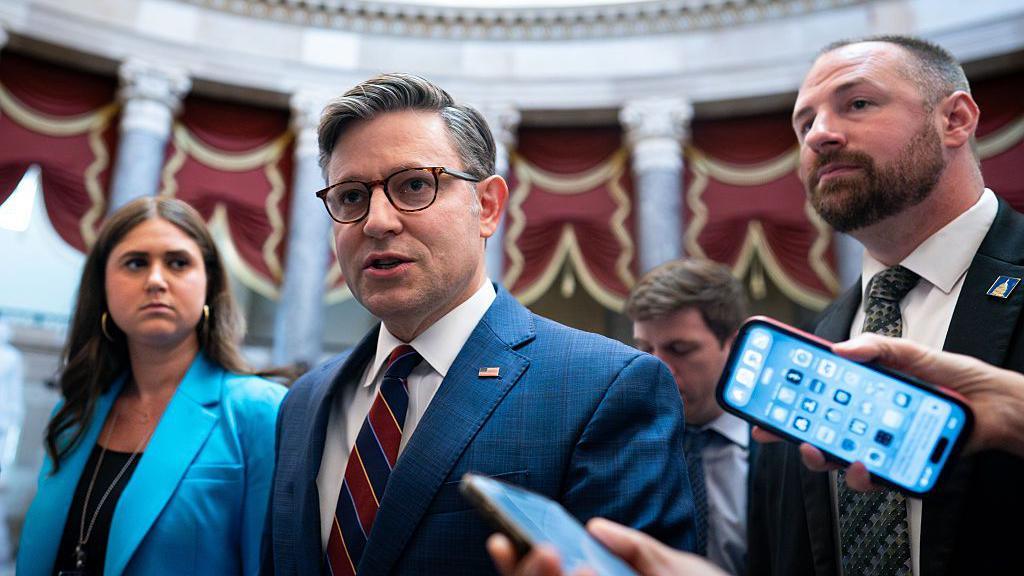“`html
Lawmakers in the United States have passed landmark national cryptocurrency legislation.
This represents a significant milestone for the cryptocurrency industry, which has actively lobbied Congress on regulatory matters for years and invested heavily in the previous election cycle, including supporting candidates like Donald Trump.
The legislation establishes a regulatory framework for stablecoins, a type of cryptocurrency backed by assets considered stable, such as the U.S. dollar.
President Trump is expected to sign the bill into law on Friday, following its passage in the House on Thursday, joining the Senate, which approved the measure last month.
Known as the Genius Act, the bill is among three pieces of cryptocurrency legislation advancing in Washington with President Trump’s support.
While the President once dismissed cryptocurrency as a scam, his stance evolved as he garnered support from the sector and became involved in the industry as a businessman, with affiliations to firms such as World Liberty Financial.
Proponents of the legislation assert that it aims to provide clear regulatory guidelines for a burgeoning industry, ensuring the U.S. remains competitive in the evolving landscape of payment systems. The cryptocurrency industry has advocated for such measures, hoping to encourage broader adoption of digital currency and integrate it further into the mainstream.
Key provisions include requirements for stablecoins, an alternative to cryptocurrencies like Bitcoin, to be backed on a one-to-one basis with U.S. dollars or other low-risk assets. Stablecoins are frequently used by traders to facilitate fund transfers between various crypto tokens.
The utilization of these coins, perceived as less volatile, has experienced rapid growth in recent years.
Critics contend that the bill introduces new risks to the financial system by legitimizing stablecoins without establishing adequate consumer protections.
They argue, for instance, that the bill could increase tech companies’ involvement in bank-like activities without subjecting them to comparable regulatory oversight, and leave customers vulnerable in the event of a stablecoin firm’s bankruptcy.
Opponents also attempted to mobilize resistance to the bill by arguing that supporting it effectively condoned President Trump’s business ventures – including his family’s promotion of their own crypto coins.
Despite this, the bill garnered substantial support from Democrats, with approximately half voting in favor, as well as the majority of Republicans.
“Some members may believe passage of this bill, even with flaws, is better than the status quo. We believe this is a fundamental misunderstanding of the risks involved with these instruments,” a coalition of consumer and advocacy groups wrote in a letter to Congress this spring.
They cautioned that passage would “allow the proliferation of assets that consumers will wrongly perceive as safe”.
Analysts had anticipated Congress to pass all three bills earlier this week, but unforeseen complications resulted in delays.
The remaining two bills have been approved by the House and are now under consideration in the Senate, where Republicans hold a slim majority. These bills aim to prevent the U.S. central bank from establishing a digital currency and to create a regulatory structure for other types of cryptocurrency.
This progress comes as President Trump is reportedly developing an executive order that could permit retirement accounts to invest in private assets, including cryptocurrency, gold, and private equity.
The value of Bitcoin reached a new all-time high this week, surpassing $120,000 (£89,000).
However, Terry Haines of Washington-based analysis firm Pangaea Policy, expressed skepticism about the prospects of the other two bills, which he considers more significant, advancing further.
“This is the end of crypto’s wins for quite a while – and the only one,” he wrote. “When the easy part, stablecoin, takes ~4 to 5 years and barely survives industry scandals, it’s not much to crow about.”
The streaming firm says AI allowed The Eternaut to complete a sequence faster and cheaper.
Network CBS called it a financial decision tied to the “challenging backdrop in late night” TV.
Karnataka CM Siddaramaiah’s Kannada post paying tributes to an actress who died was wrongly translated into English.
A month since Donald Trump called in the National Guard, raids continue to spark violent protests – and fear.
The president’s press secretary says bruising on his hands is consistent with damage from frequent handshakes while taking aspirin.
“`

